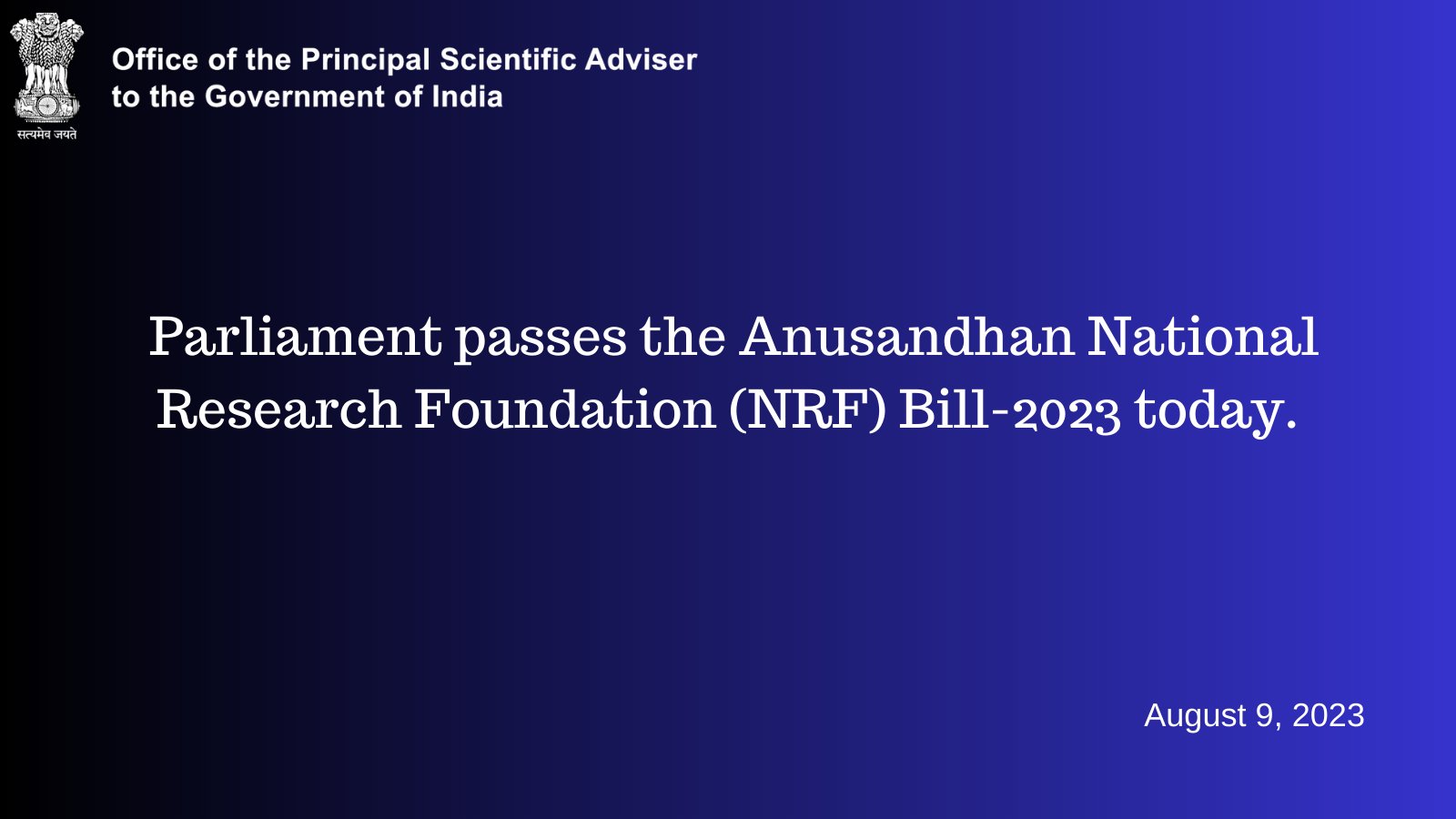In a significant development for India’s research and innovation landscape, the Rajya Sabha has successfully passed the Anusandhan National Research Foundation Bill 2023. This legislation sets the stage for the creation of a national agency dedicated to funding research across universities in the country. The Bill passing is an important step for promoting scientific research and encouraging innovation.
- 🌟 The “Anusandhan National Research Foundation” Bill is set to define India’s global status by 2047.
- 🌐 This legislation will facilitate India’s entry into the league of developed nations through research and innovation.
- 🏛️ The Bill has been passed by both houses of the Parliament and emphasizes collaboration between academia, industry, and government.
- 💰 Over Rs. 50,000 crores will be allocated to NRF over five years, with a significant portion from non-government sources.
- 🏫 Separate funds and competition will be earmarked for State Universities and Institutions.
- 🧪 The NRF’s mandate encompasses various disciplines and aims to foster a culture of research and innovation across the nation.
- 🚀 NRF will be governed by eminent researchers and professionals under the guidance of the Prime Minister.
Facts
- 🏢 The “Anusandhan National Research Foundation” Bill aims to elevate India’s scientific and technological standing by 2047.
- 📜 The Bill has been approved by both the Lok Sabha and Rajya Sabha.
- 💡 It promotes collaboration between academia, industry, and government for research and innovation.
- 💸 A substantial portion of the allocated budget, Rs. 36,000 crore, will come from non-government sources including industry and philanthropy.
- 🎓 The Bill ensures separate allocation and competition for State Universities and Institutions.
- 🌍 NRF’s scope includes natural sciences, engineering, technology, environmental sciences, health, and agriculture.
- 👥 The foundation will be led by eminent researchers and professionals with guidance from the Prime Minister.
In the discussion on the Anusandhan National Research Foundation Bill, I raised the need to increase R&D spending, ensure non-partisan research and enhance women participation in STEM. pic.twitter.com/ZF3uxLzm6F
— Vijayasai Reddy V (@VSReddy_MP) August 9, 2023
Outcomes of the Bill: The approval of the Anusandhan National Research Foundation Bill 2023 carries several outcomes that are expected to reshape India’s research and development ecosystem:
- Establishment of National Research Foundation (NRF): The Bill gives way to the establishment of the NRF, which will serve as an apex body responsible for providing strategic direction to scientific research in India. This initiative aligns with the recommendations of the National Education Policy (NEP).
- Funding Research and Development (R&D): The NRF will play a pivotal role in seeding, nurturing, and advancing research and development initiatives across universities, colleges, research institutions, and R&D laboratories. This will promote a culture of research-driven innovation.
- Financial Allocation: The Bill outlines a total estimated cost of Rs 50,000 crore over a span of five years (2023-28) to support the NRF’s endeavors. This financial commitment underscores the government’s commitment to fostering research excellence.
- Collaborative Approach: The NRF’s mandate encompasses forging collaborations between academia, industry, and government entities. This holistic approach is aimed at encouraging participation and contribution from a wide range of stakeholders.
- Institutional Structure: The NRF will be governed by a Governing Board composed of distinguished researchers and professionals from various disciplines. The administrative aspect will be overseen by the Department of Science and Technology (DST).
- High-Level Leadership: The Prime Minister of India will serve as the ex-officio president of the NRF’s Governing Board. The Union Minister of Science & Technology and the Union Minister of Education will serve as ex-officio vice-presidents. An Executive Council chaired by the Principal Scientific Adviser to the Government of India will oversee NRF’s functioning.
- Policy Framework and Collaboration: The NRF will focus on crafting a policy framework that promotes collaboration between different sectors, including academia, industry, and government departments. Regulatory processes will be established to incentivize increased industry spending on R&D.
Support and Opposition: While the Bill saw an efficient passage in the Rajya Sabha, it was not without its share of debates and discussions. Notably, the Opposition had walked out of the House, resulting in only six members participating in the debate. Science and Technology Minister Jitendra Singh lauded the Bill’s significance, terming it “history in the making” with anticipated long-term outcomes. Opposition members’ absence during the discussion prompted the government to express eagerness for constructive inputs from all sides.
The Anusandhan National Research Foundation Bill 2023’s approval marks a pivotal moment for India’s research landscape. With its focus on fostering collaboration, encouraging innovation, and strategically funding research and development, the NRF is poised to reshape the nation’s scientific trajectory. As India seeks to bolster its position on the global research stage, this legislation represents a forward-looking stride towards realizing that goal.
#RajyaSabha passes The Anusandhan National Research Foundation Bill, 2023, moved by Union Minister @DrJitendraSingh. #ANRF @PMOIndia @rajesh_gokhale @guptaakhilesh63 @serbonline pic.twitter.com/F224XfQAJb
— DSTIndia (@IndiaDST) August 9, 2023
What a historic day !! Anusandhan National Research Foundation Bill 2023 passed by both the Houses of Parliament.
— Dr Akhilesh Gupta (@guptaakhilesh63) August 9, 2023
Had the honour of being present during the passage of the Bill in the Lok Sabha on 7th and Rajya Sabha (today). @PMOIndia @DrJitendraSingh @IndiaDST @serbonline pic.twitter.com/IBxNMK8ZTj






